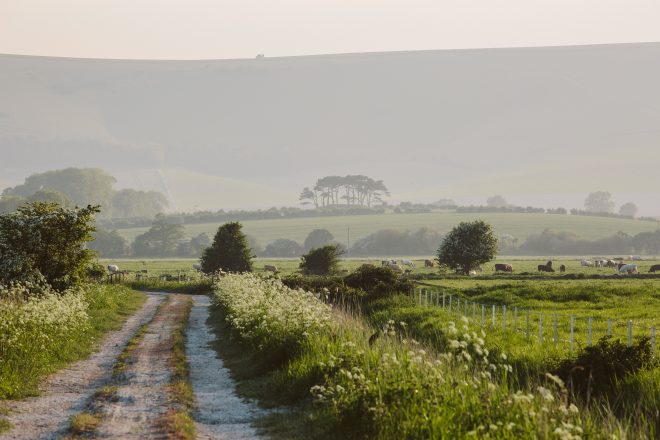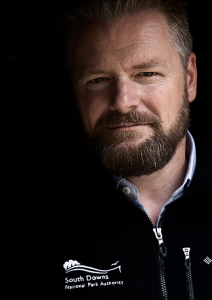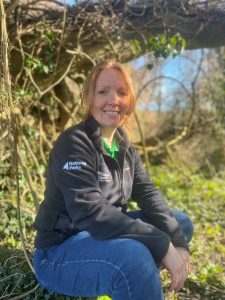Groundbreaking biodiversity credits initiative in South Downs is off to flying start
April 29, 2025
Efforts to create a huge new wildlife haven in the South Downs National Park through private investment are well under way.
Over 50 hectares of the Iford Estate – or 80 football pitches – have now been formally dedicated to nature restoration, thanks to two groundbreaking legal agreements with the National Park Authority.
Iford has just signed a second Section 106 agreement with the Authority, bringing the East Sussex estate a step closer to its vision of devoting two thirds of the estate to nature. The 18.75 hectares of new space for nature comes on top of the 31.8 hectares dedicated to wildlife in 2023.
Among the key projects is transforming intensively-farmed fields into a new thriving deciduous woodland the size of 24 football pitches. It is hoped that threatened species such as the hazel dormouse and spotted flycatcher will be able to flourish and increase in numbers thanks to the new habitats being created.
Ultimately, it’s hoped that the new wildlife haven, which will include woodlands and wildflower meadows, can provide a home for over 1,000 species – over half of them being protected species in the South Downs region.

The private investment works whereby businesses or individuals can invest in a parcel of land, or a ReNature Credit, each measuring 3m by 3m, that is then secured for nature for the next 30 years.
The ReNature Credits can be bought either for mandatory Biodiversity Net Gain associated with development inside or outside the National Park or, alternatively, as Voluntary Biodiversity Credits – an initiative that was launched last year with the South Downs being the first National Park to start such a scheme.
The voluntary scheme at Iford is being run in partnership with Earthly to establish a new Nature Market that makes it easy for businesses to invest in biodiversity recovery. The Voluntary Biodiversity Credits can be purchased through Earthly’s marketplace, alongside other high-integrity nature-based projects from around the world. Earthly has created a unique biodiversity ledger that represents all purchased credits to maximise transparency and ensure against double counting.
The voluntary scheme allows businesses of all sizes and sectors to invest in nature recovery and has gained significant interest since its launch last May. Under the voluntary scheme, 217 Credits – worth almost £40,000 – have so far been purchased to help create new habitat.
Among the investors have been King – the entertainment company behind the world-famous Candy Crush Franchise – and other businesses and members of the public.
The National Park Authority is currently in discussions with several landowners across the South Downs with a view to dedicating hundreds more hectares of land to nature recovery, securing the land for biodiversity through Section 106 legal agreements.
 Nick Heasman, who heads the National Park’s Consultancy Team that is leading the project, said: “Since launching just over six months ago, we’ve seen this initiative gather real momentum and it’s very exciting to see.
Nick Heasman, who heads the National Park’s Consultancy Team that is leading the project, said: “Since launching just over six months ago, we’ve seen this initiative gather real momentum and it’s very exciting to see.
“I think the amount of interest we’ve had underlines the fact that people see there is a biodiversity crisis and want to do something to help. In the UK, 41 per cent of species have declined in abundance over the past 40 years and many are severely threatened, so there’s no time to wait and see what happens – we’ve got to start reversing that decline now.
“The project demonstrates that nature recovery can be funded in lots of different ways and there’s tremendous appetite from the private sector, as well as members of the public and local communities, to make a difference. We’re just at the start of this journey and I’m looking forward to seeing what successes we can achieve over the next couple of years.”
And Nick added: “It’s important to say that this is not about taking away food production from the South Downs, which is a major area for arable, livestock and viticulture. Our aim is to work with landowners to support them in their aspirations to deliver high-quality, nature-friendly food production on their best farming land and devote their more marginal, less productive land to nature.”
Ben Taylor, who manages the Iford Estate, said: “This innovative new scheme offers the possibility of nature recovery at scale, in one of the most important landscapes in the country. Purchasers can be assured that with the South Downs National Park involved they are buying something worthwhile. With their unique What3Words address they can locate and view their contribution to nature recovery, unlike other schemes which are much less tangible.”
Lorenzo Curci, Co-founder of Earthly, said: “Biodiversity in the UK is under immense pressure. Voluntary biodiversity credits offer a powerful way for the private sector to invest in local nature as part of the broader nature positive movement being led by responsible businesses. It’s not just about offsetting harm, but actively restoring ecosystems for the future. By embracing these credits, businesses become vital partners in securing a healthy future for our planet and establishing a positive legacy.”

People can now get in touch with the National Park Authority to purchase biodiversity credits and be a part of the journey to create a new nature haven at Iford. The cost of one Voluntary Biodiversity Credit is £170.50, which secures a 3×3 metre parcel of land for nature recovery. Each credit is mapped with its own unique reference and secured formally to ensure it remains in place for at least 30 years. Please visit www.southdowns.gov.uk/renature-credits/contact/ or email Sarah Westbrook, Nature-based Solutions Officer at the National Park, at Sarah.Westbrook@southdowns.gov.uk
- Four years ago the National Park Authority launched its ReNature campaign to transform 13,000 hectares into new habitat to help nature thrive. A total of 6,082 hectares – an area bigger than Worthing or Portsmouth – has now been created or improved to help nature thrive. The work has included planting almost 50,000 trees, adding over 100 hectares of wildflowers, planting hedges, restoring ponds, and improving rare habitats such as chalk grassland and lowland heath. Find out more about ReNature at www.southdowns.gov.uk/renature/
- Iford Estate is a 1,200ha (3,000 acre) mixed farm situated wholly within the South Downs National Park, near Lewes in East Sussex. The principal enterprises are the production of cereals and beef, alongside a diverse range of properties and leisure facilities. The estate has also placed a strong focus on protecting and enhancing the environment – and aims to become an exemplar landscape restoration project. Find out more here www.ifordbiodiversityproject.co.uk
- Biodiversity Net Gain is an approach to development that aims to leave the natural environment in a “measurably better” state than it was beforehand. It can include planting trees and creating new areas for animals to live such as ponds, hedgerows and meadows.
